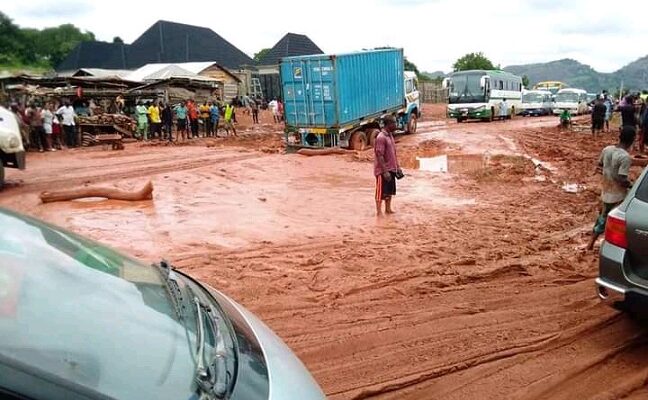By Arogbonlo Israel
The deplorable state of federal roads in Okunland has become a social media sensation with many still counting their losses due to the negligence of those who out of ‘political gains’ see no reason to find a lasting solution to ameliorate this state dysfunction.
Okunland, situated in Kogi West, is blessed with both human and nonhuman resources that can be instrumental to the growth of Nigeria if well harnessed and given the needed attention.
The state (Kogi) itself borders more than nine states, with a heavy flow of daily traffic from North and South, but has been in neglect for some years now as a result of what can best be termed as the ‘failure of leaders’ who, as a matter of necessity ought to take responsibility, by making good governance accessible to the people irrespective of ethnic, religious or political affiliations.
All thanks to some grassroot leaders (name withheld) in Okunland who have started obeying the clarion call, paying action to the yearnings of the people on whose mandate they are enjoying. Governance is not supposed to be self-service as some rightly practiced it to be, but rather a selfless service that is people-oriented and proactive.
There is no sense when people are neglected and left with no option than to find alternative solutions to problems that should rather be solved by the leaders. What is the essence of government if people still repair roads with their hard-earned stipends or what benefit is it when citizens provide social amenities for themselves?

Going forward, the sum of N621.2bn was approved recently by the Federal Executive Council, which the Nigerian National Petroleum Corporation (NNPC) will use for the reconstruction of 21 federal roads in the country. The fund which will cover the 21 roads spread across the six geopolitical zones in the country was a strategic intervention under the federal government Road Infrastructure and Refreshment Tax Credit Scheme, according to Babatunde Fashola, the Minister of Works and Housing.
However, it was a surprise when Kogi was excluded from the list of the beneficiary states. The question now is, why was Kogi excluded from the list? Is Kogi not part of the Federal Republic of Nigeria? It will be logical for those who deployed the tax resources to these selected states to come out bold and tell Kogites the reason for this deprivation and rejection.
Why Okun Roads need urgent revamping
In 2020, the Nigerian Investment Promotion Commission (NIPC) rated Kogi as the top destination of investment in Nigeria $1 billion (25 percent) above Lagos who scored $239 million (six percent), followed by Ogun state with $75 million (two percent); and Cross River state with $15 million (0.4 percent). This was contained in NIPC’s “report of investment announcements in Nigeria (July – September 2020)” by its department of strategic communications. Thus, Kogi is indeed a ‘confluence of opportunities’ for investors.
However, investment will not thrive if there is poor road network, which breeds insecurity and in turn, poses dangers for investors. For instance, if an investor comes to invest in Okunland and finds it difficult to travel around the region as a result of deplorable roads, hence, such investor would have no choice than to look for a better state where road networks are accessible.
It is high time the federal government gave rapt attention to the plights of Kogites as the state government’s efforts are not enough to solve the situation at hand. There is a need for synergy between both local, state and federal government to address this infrastructural decadence before it is too late.
Road networks in Kogi, Okunland in particular do not need empathy (as some are portraying on social media), but a state of emergency must be declared to salvage the state from depletion and ‘lost of identity’. The importance of a good road network cannot be overemphasized and it is in this regard, the concerned stakeholders must wake up from the glaring conspiracy of silence at play, to obey the clarion call, work the talk, and take holistic actions towards addressing the plights of the masses.
With accessible roads in Okunland, there will be drastic reduction of the cost of transportation, both in terms of money and time, and will also help in the integration of various regions within the country and the better understanding of neighbouring countries at the international level.
– Arogbonlo Israel is a journalist and good governance advocate with keen interest in solution journalism.





